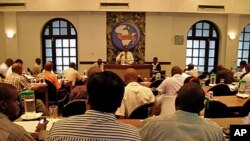The weekly tea auction in Mombasa, Kenya, is one of the largest black tea auctions in the world, where etiquette and old-world manners still reign. Planned modernization, however, promises to turn tradition on its head.
Every Monday and Tuesday, around 80 brokers and buyers gather together in an elegant colonial building in Mombasa to haggle, every so graciously, over the price of tea. This is the Mombasa Tea Auction, a genteel old institution dating back to colonial times.
The tea auction may look old-fashioned, but each year it manages to move around 345 million kilos of black tea from nine countries. This makes it the largest black tea auction center in the world, according to Peter Kimanga, chairman of the East African Tea Trade Association.
The rules of etiquette are strict - neckties for the brokers, even in the stifling Mombasa heat, and smart collared shirts for the buyers. In the auction room, men address one another as “sir,” and despite the absence of microphones, you rarely hear anyone raise their voice. Geoffrey Rimbere, manager of the auction house, explains why.
“Every year we have workshop on etiquette and decorum in the auction room. You can’t use language which is not acceptable there, or behave in a manner which is abnormal. That’s the culture up here. You cannot use unfriendly language. Even if you don’t get the kitty, you still have manners,” said Rimbere.
Kenya’s tea industry dates back to 1903, and 62 percent of the tea is grown by small-scale farmers. The auction still has a decidedly old-world feel to it. But well-mannered as it is, the tea moves fast, selling at around five lots a minute, and the buyers watch one another like hawks.
But all of this is about to change, as the Mombasa Tea Auction prepares to go online by 2013. The old open outcry system will be replaced by electronic auction at which buyers will bid from their computers, never interacting with one another at all.
Rimbere explains that the switch is necessary to keep up in a fast-moving industry. An online system will streamline things, he said, allowing brokers to move more tea faster and cutting down on warehousing costs.
Still, not everyone is convinced that this change is for the best. Many of the buyers themselves, such as Aweys Mohamed, are skeptical that Mombasa has the infrastructure necessary to make an e-auction work, and are afraid of the effect it will have on the local economy.
"The Internet connection in this country is very bad - the bandwidth is not that good. What happens when you are bidding some tea and suddenly your connection went down? What happens to some of the clients? They can bid from anywhere. What happens to the interests of the local companies who are employing local people here to handle all of that?" asks Mohamed.
Across the street from the auction house, in a venerable old building, sits Africa Tea Brokers, the largest brokerage in Kenya. Its director, Tom Muchura, tastes hundreds of teas every week, noting the taste, color and strength of each one before they go to auction.
“You’re taking something into your palate by sucking it in. Then you swirl it around your mouth so that is does go into the areas where it will be tasted, and then you spit it. You probably see us tasting in excess of 250 cup[s] at any go, and one is able to actually pick the difference between each and every cup,” said Muchura.
Muchura has been working at Africa Tea Brokers for more than 40 years, and the e-auction is not the most significant change he has seen. The industry itself has exploded in East Africa, he said, and demand is on the rise, particularly in Muslim countries.
But, he said, the electronic auction system definitely will change the way brokers and buyers interact. An important psychological element will be lost, he said, but it is a transition that most probably is inevitable.
“By nature I’m conservative, and I’ve known the tea industry in that form all my life. As a broker, I am able to tell whether a buyer has probably an extra cent or so, because I can see him, I can see his body language," said Muchura. "It’s very easy also for buyers in the auditorium to know who is buying and be able to say, look, this is a buyer I can actually push, or this is a buyer I cannot push. That physical presence is important. And yes, we will miss the way we have operated in the past. But I think because of the volumes that we are having to trade with, it is only natural that this change comes about.”
With more than 50 percent of the e-auction system already in place, there is little doubt that change is on its way. And although Mombasa’s old traditions are on the way out, East African tea definitely seems to be on the way up.












